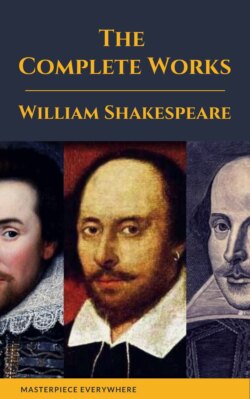Читать книгу The Complete Works of Shakespeare - William Shakespeare, Masterpiece Everywhere - Страница 36
На сайте Литреса книга снята с продажи.
Scene III
ОглавлениеEnter Antonio and Panthino.
Ant.
Tell me, Panthino, what sad talk was that
Wherewith my brother held you in the cloister?
Pan.
’Twas of his nephew Proteus, your son.
Ant.
Why, what of him?
Pan.
He wond’red that your lordship
Would suffer him to spend his youth at home,
While other men, of slender reputation,
Put forth their sons to seek preferment out:
Some to the wars, to try their fortune there;
Some to discover islands far away;
Some to the studious universities.
For any or for all these exercises
He said that Proteus, your son, was meet;
And did request me to importune you
To let him spend his time no more at home,
Which would be great impeachment to his age,
In having known no travel in his youth.
Ant.
Nor need’st thou much importune me to that
Whereon this month I have been hammering.
I have consider’d well his loss of time,
And how he cannot be a perfect man,
Not being tried and tutor’d in the world:
Experience is by industry achiev’d,
And perfected by the swift course of time.
Then tell me, whither were I best to send him?
Pan.
I think your lordship is not ignorant
How his companion, youthful Valentine,
Attends the Emperor in his royal court.
Ant.
I know it well.
Pan.
’Twere good, I think, your lordship sent him thither:
There shall he practice tilts and tournaments,
Hear sweet discourse, converse with noblemen,
And be in eye of every exercise
Worthy his youth and nobleness of birth.
Ant.
I like thy counsel; well hast thou advis’d;
And that thou mayst perceive how well I like it,
The execution of it shall make known:
Even with the speediest expedition
I will dispatch him to the Emperor’s court.
Pan.
To-morrow, may it please you, Don Alphonso
With other gentlemen of good esteem
Are journeying to salute the Emperor,
And to commend their service to his will.
Ant.
Good company; with them shall Proteus go—
[Enter] Proteus.
And in good time! now will we break with him.
Pro.
Sweet love, sweet lines, sweet life!
Here is her hand, the agent of her heart;
Here is her oath for love, her honor’s pawn:
O that our fathers would applaud our loves,
To seal our happiness with their consents!
O heavenly Julia!
Ant.
How now? what letter are you reading there?
Pro.
May’t please your lordship, ’tis a word or two
Of commendations sent from Valentine,
Deliver’d by a friend that came from him.
Ant.
Lend me the letter; let me see what news.
Pro.
There is no news, my lord, but that he writes
How happily he lives, how well-belov’d
And daily graced by the Emperor;
Wishing me with him, partner of his fortune.
Ant.
And how stand you affected to his wish?
Pro.
As one relying on your lordship’s will,
And not depending on his friendly wish.
Ant.
My will is something sorted with his wish:
Muse not that I thus suddenly proceed;
For what I will, I will, and there an end.
I am resolv’d that thou shalt spend some time
With Valentinus in the Emperor’s court;
What maintenance he from his friends receives,
Like exhibition thou shalt have from me.
To-morrow be in readiness to go—
Excuse it not, for I am peremptory.
Pro.
My lord I cannot be so soon provided:
Please you deliberate a day or two.
Ant.
Look what thou want’st shall be sent after thee.
No more of stay: to-morrow thou must go.
Come on, Panthino; you shall be employ’d
To hasten on his expedition.
[Exeunt Antonio and Panthino.]
Pro.
Thus have I shunn’d the fire for fear of burning,
And drench’d me in the sea, where I am drown’d.
I fear’d to show my father Julia’s letter,
Lest he should take exceptions to my love,
And with the vantage of mine own excuse
Hath he excepted most against my love.
O, how this spring of love resembleth
The uncertain glory of an April day,
Which now shows all the beauty of the sun,
And by and by a cloud takes all away.
[Enter Panthino.]
Pan.
Sir Proteus, your [father] calls for you:
He is in haste; therefore I pray you go.
Pro.
Why, this it is: my heart accords thereto,
And yet a thousand times it answers ‘no.’
Exeunt.
¶
